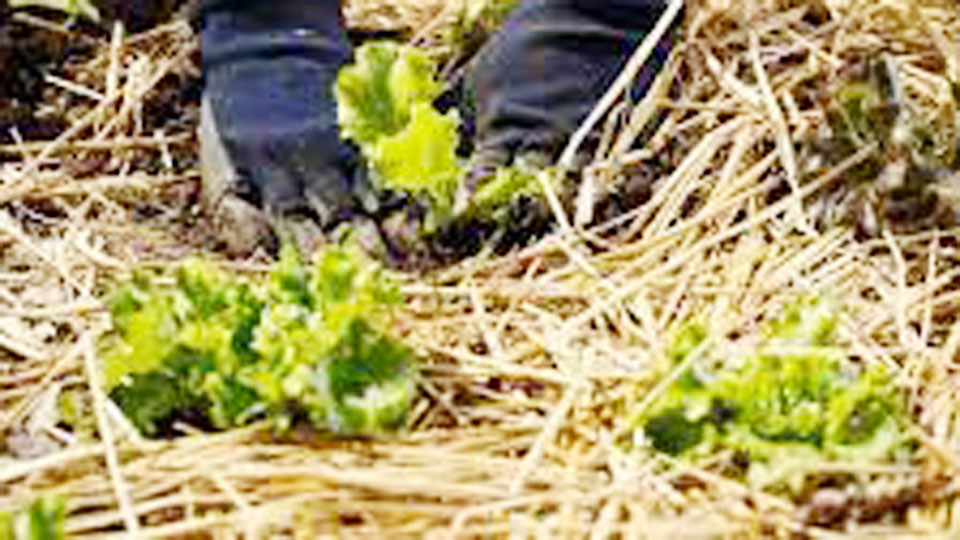I’ve been growing vegetables for years, and one of the best things I ever did for my garden was start using mulch. If you’re wondering whether mulch is good for vegetable gardens, let me tell you—it’s not just good, it’s essential.
Mulch does so much more than just making a garden look neat. It keeps the soil healthy, helps plants grow better, and even saves time and effort in maintaining a garden.

Image by growfully
When I first started gardening, I didn’t think mulch was that important. But after a few seasons of struggling with weeds, dried-out soil, and inconsistent plant growth, I gave mulch a try.
The difference was incredible. My plants grew stronger, required less watering, and I spent way less time weeding. Now, I wouldn’t garden without it.
So, if you’re thinking about adding mulch to your vegetable garden, you’re making a smart choice. Let’s talk about why mulch is so beneficial, the best types to use, and how to apply it properly to get the most out of your vegetable garden.
What Is Mulch and Why Does It Matter?
Mulch is simply a layer of material spread over the soil to protect and improve it. It can be organic, like straw, wood chips, leaves, and grass clippings, or inorganic, like plastic or gravel. For vegetable gardens, organic mulch is the best choice because it improves soil health as it breaks down.
I like to think of mulch as a protective blanket for the soil. It keeps moisture in, regulates temperature, prevents weeds, and even enriches the soil with nutrients. When done right, mulching can transform a struggling vegetable garden into a thriving, productive space.
Benefits of Using Mulch in a Vegetable Garden
Mulch Helps Retain Moisture
Water is crucial for a vegetable garden, but it can evaporate quickly, especially during hot summers. Mulch acts like a barrier, reducing evaporation and keeping moisture in the soil longer. This means less frequent watering and healthier plants.
I’ve noticed that when I mulch, my soil stays damp for days, even during dry spells. Without mulch, I’d be out there with a watering can much more often.
Mulch Prevents Weeds
Weeds are one of the biggest headaches in gardening. They steal nutrients, water, and sunlight from vegetables, making it harder for your plants to grow. Mulch blocks weed seeds from getting sunlight, which stops them from sprouting.
I used to spend hours pulling weeds, but once I started mulching, the problem nearly disappeared. Now, I spend more time enjoying my garden and less time fighting unwanted plants.
It Regulates Soil Temperature
Extreme temperatures can stress plants, slowing their growth or even killing them. Mulch keeps the soil cool in the summer and warm in the winter, protecting plant roots from sudden temperature changes.
I’ve seen firsthand how mulch can prevent heat stress in summer and frost damage in fall. It’s like insulation for your garden.
Mulch Improves Soil Health
Organic mulch doesn’t just sit on top of the soil—it breaks down over time, enriching the soil with nutrients. This creates a better environment for plant roots and beneficial microorganisms.
Every season, I notice my soil getting darker, richer, and easier to work with, all thanks to mulching. It’s like feeding the soil without having to add extra fertilizers.
Prevents Soil Erosion and Compaction
Heavy rain and strong winds can wash away topsoil, taking valuable nutrients with it. Mulch holds the soil in place, reducing erosion and keeping nutrients where they belong.
It also prevents soil compaction. Without mulch, rain can create a hard crust on the soil, making it difficult for water and air to reach plant roots. Mulch keeps the soil loose and breathable.
Keeps Vegetables Clean and Healthy
One thing I love about mulch is that it keeps my vegetables cleaner. Without it, rain splashes dirt onto leafy greens, tomatoes, and other low-growing plants. Mulch acts like a barrier, reducing mud splatter and keeping produce fresh.
Best Types of Mulch for Vegetable Gardens
Not all mulches are created equal, and the best choice depends on your garden’s needs. Here’s a breakdown of the best mulches for vegetable gardens:
| Type of Mulch | Pros | Cons | Best Use |
|---|---|---|---|
| Straw | Retains moisture, prevents weeds, breaks down easily | Can attract pests if not properly sourced | Great for all vegetables, especially tomatoes and peppers |
| Grass Clippings | Free and rich in nitrogen | Can mat down and become slimy if too thick | Good for nitrogen-hungry plants like corn and lettuce |
| Wood Chips | Long-lasting, looks neat | Can tie up nitrogen as it decomposes | Best for pathways or around perennials, not ideal for annual vegetables |
| Leaves | Free, improves soil structure | Can blow away easily, takes time to decompose | Works well for root crops like carrots and beets |
| Compost | Adds nutrients, improves soil health | Can wash away in heavy rain | Excellent for enriching soil while mulching |
| Black Plastic | Prevents weeds and warms soil | Doesn’t improve soil health, can overheat plants | Best for heat-loving crops like melons and peppers |
I personally love using straw and grass clippings because they break down quickly and improve the soil. If you’re growing tomatoes or squash, straw is a fantastic choice. For leafy greens, grass clippings work well.
How to Apply Mulch to a Vegetable Garden
If you want mulch to work its magic, you need to apply it correctly. Here’s how I do it:
- Clear the Area – Before adding mulch, I remove any existing weeds to prevent them from growing underneath.
- Water the Soil First – I always water the soil before mulching so the moisture is locked in.
- Spread the Mulch Evenly – A 2 to 4-inch layer is best. Too thin, and weeds can break through. Too thick, and it may prevent water from reaching the soil.
- Keep Mulch Away from Stems – I always leave a small gap around plant stems to prevent rot and pests.
- Replenish as Needed – Organic mulch breaks down over time, so I add more throughout the season to maintain coverage.
Common Mulching Mistakes to Avoid
Even though mulching is simple, there are a few mistakes I learned to avoid:
- Using too much mulch – More isn’t always better. Too thick a layer can prevent water from reaching plant roots.
- Placing mulch too close to plants – This can cause rot and attract pests.
- Using fresh wood chips in vegetable beds – These can rob the soil of nitrogen, slowing plant growth.
- Not replenishing mulch – Organic mulch breaks down, so it needs to be replaced regularly.
Conclusion
If you’re serious about growing healthy, productive vegetables, mulch is one of the best things you can add to your garden. It keeps moisture in, stops weeds, improves soil health, and even protects plants from extreme temperatures.
I’ve seen the difference mulch makes, and I’ll never go back to gardening without it. Whether you choose straw, compost, grass clippings, or another organic mulch, your plants will thank you.
Give it a try this season—you’ll be amazed at how much easier and more rewarding gardening becomes with the right mulch.
Frequently Asked Questions (FAQs)
Can I use mulch in a raised vegetable garden?
Absolutely! Mulch works just as well in raised beds as it does in traditional gardens. It keeps the soil moist and prevents weeds.
How often should I replace mulch?
Organic mulch breaks down over time, so it’s good to add fresh layers every few months or at least once a season.
What’s the best mulch for tomatoes?
Straw is one of the best mulches for tomatoes because it keeps moisture in and prevents soil-borne diseases from splashing onto the leaves.
Can mulch attract pests?
Some types, like thick wood chips, can attract insects if not properly managed. Keeping mulch a few inches away from plant stems helps prevent pest problems.
Should I remove old mulch before adding new?
Not always. If the old mulch is still in good shape, you can just add a fresh layer on top to keep the coverage even.

I’m Marissa Lynn, the proud author behind GardeningProperty.com! With a deep-rooted passion for all things green and growing, I’ve dedicated years to mastering the art and science of gardening.
From nurturing vibrant flowerbeds to cultivating thriving vegetable gardens, I love sharing practical tips, creative ideas, and proven techniques to help others create their dream outdoor spaces.